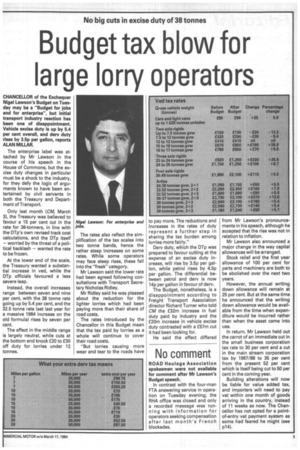Budget tax blow for large lorry operators
Page 5

If you've noticed an error in this article please click here to report it so we can fix it.
CHANCELLOR of the Exchequer Nigel Lawson's Budget on Tuesday may be a "Budget for iobs and for enterprise", but initial transport industry reaction has been one of disappointment. Vehicle excise duty is up by 5.4 per cent overall, and dery duty rises by 3.5p per gallon, reports ALAN MILLAR.
The enterprise label was attached by Mr Lawson in the course of his speech in the House of Commons, but the excise duty changes in particular must be a shock to the industry, for they defy the logic of arguments known to have been entertained by civil servants in both the Treasury and Department of Transport.
Only last month (CM, March 3), the Treasury was believed to favour a 15 per cent cut in the rate for 38-tonners, in line with the DTp's own revised track cost calculations, and the DTp itself worried by the threat of a political backlash wanted the rate to be frozen.
At the lower end of the scale, the Treasury wanted a substantial increase in ved, while the DTp officials favoured a less severe leap.
Instead, the overall increases range between seven and nine per cent, with the 38 tonne rate going up by 5.4 per cent, and the 32.5 tonne rate (set last year for a massive 1984 increase on the old formula) rises by seven per cent.
The effect in the middle range is largely neutral, while cuts at the bottom end knock £20 to £30 off duty for lorries under 12 tonnes. The rates also reflect the simplification of the tax scales into two tonne bands, hence the rather steep increases on some rates. While some operators may face steep rises, these fall into the "freak" category.
Mr Lawson said the lower rate had been agreed following consultations with Transport Secretary Nicholas Ridley.
Mr Ridley said he was pleased about the reduction for the lighter lorries which had been paying more than their share of road costs.
The rates introduced by the Chancellor in this Budget mean that the tax paid by lorries as a whole will continue to cover their road costs.
"But lorries causing more wear and tear to the roads have
to pay more. The reductions and increases in the rates of duty represent a further step in sharing the tax burden among lorries more fairly."
Dery duty, which the DTp was prepared to favour cutting at the expense of an excise duty increase, will rise by 3.5p per gallon, while petrol rises by 4.5p per gallon. The differential between petrol and dery is now 14p per gallon in favour of derv.
The Budget, nonetheless, is a disappointment according to Freight Transport Association director Richard Turner who told CM the £32m increase in fuel duty paid by industry and the £20m increase in vehicle excise duty contrasted with a £57m cut it had been looking for.
He said the effect differed from Mr Lawson's pronouncements in his speech, although he accepted that the rise was not in relation to inflation.
Mr Lawson also announced a major change in the way capital allowances will be arranged.
Stock relief and the first year allowance of 100 per cent for parts and machinery are both to be abolished over the next two years.
However, the annual writing down allowance will remain at 25 per cent. But at the same time he announced that the writing down allowance would be available from the time when expenditure would be incurred rather than when the asset came into
US8.
In return, Mr Lawson held out the carrot of an immediate cut in the small business corporation tax rate to 30 per cent and a cut in the main stream corporation tax by 1987/88 to 35 per cent from the present 52 per cent which is itself being cut to 50 per cent in the coming year.
Building alterations will now be liable for value added tax, and importers will need to pay vat within one month of goods arriving in the country, instead of 11 weeks as now. The Chancellor has not opted for a pointof-entry vat payment system as some had feared he might (see p14).
















































































































